How to Learn Python in 2025? [A Guide for Learners of All Ages]
By Wiingy on Jun 05, 2024
Updated Mar 27, 2025
![How to Learn Python in 2025? [A Guide for Learners of All Ages]](/_next/image/?url=https%3A%2F%2Fimages.wiingy.com%2FBlog%2Fimage%2F1743003211362_How_to_Learn_Python_in_2025.webp&w=1920&q=50)
In this article
Ready to embark on your Python journey, sharpen your programming skills, or master advanced concepts? This comprehensive ‘How to Learn Python’ guide is tailored to support learners at all levels in navigating Python’s vast landscape.
- Master Python with Ease: Discover proven techniques to build a solid foundation in Python programming, and enhance your skills in areas like web development, data science, and machine learning, using various resources such as tutoring, courses, and interactive projects.
- Unlock Top Python Learning Resources: Explore the best online tutoring services, highly-rated courses, web tutorials, bootcamps, and books designed to make learning Python accessible and engaging for every learner.
- Get Expert Help: Don’t tackle Python challenges alone. Personalized tutoring offers the guidance you need to overcome obstacles and accelerate your programming growth.
Expand your programming skills for AP CSA with our guide: Best Ways to Prepare for AP CSA.
Start learning Python today—Book a free trial lesson with Wiingy and receive flexible, expert-led tutoring sessions tailored to your goals. Experience how customized lessons can accelerate your Python journey.
How to Learn Python: 9 Best Ways
The first step to learning Python is to choose the right source. Research about what method of teaching aligns with your method of learning. For in-depth knowledge, learners should opt for tutoring as their choice, which would help them grasp the fundamentals needed to master the language.
Video tutorials are a great way to grasp Python concepts visually. Check out our curated list of the best YouTube channels to learn Python for high-quality video lessons.
With plenty of resources available, settling on one source can be baffling. Here we have a comprehensive list of all the learning sources:
| Learning Method | Recommended Age Group | Efficacy | Cost |
|---|---|---|---|
| 1. Online Python Tutoring | All age groups (Elementary to Professionals) | High – Personalized support and targeted learning | Moderate – Typically $28-$70 per hour |
| 2. Python Courses | High School to Professionals | High – Structured learning with expert guidance | Moderate to High – Usually $10-$100 per course |
| 3. Python Web Tutorials | High School to Professionals | Moderate – In-depth description for self-learners | Low to Free – Most resources are free |
| 4. Python Bootcamps | College Students and Career Switchers | High – Intensive, career-focused learning | High – $1,049 to $10,900 depending on duration |
| 5. Python Certifications | High School to Professionals | High – Validation of skills for job opportunities | Moderate – Exam fees range from $59 to $195 |
| 6. Python Projects | High School to Professionals | High – Practical, hands-on experience | Low to Free – Cost depends on project scope |
| 7. Python Books | Middle School to Professionals | High – Comprehensive coverage of Python topics | Low to Moderate – $10-$50 per book |
| 8. YouTube Channels | All age groups | Moderate – Free learning with diverse resources | Free – No cost for watching content |
| 9. LinkedIn Learning | High School to Professionals | High – Professional development and practical applications | Moderate – Subscription typically $30/month |
1. Online Python tutoring
If you’re looking to learn Python, online tutoring is the best option. A qualified teacher’s tutoring would help you pick up fundamentals quickly. Here we’ll take a look at the top 3 tutoring services available for learning Python :
[1.1] Wiingy
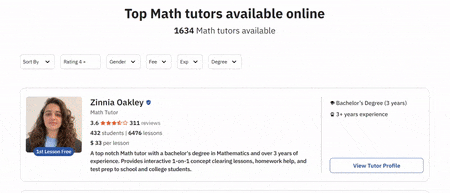
Wiingy offers personalized 1-on-1 tutoring sessions where you can book a free lesson, chat with academic advisors, pitch in your learning requirements, then you can be mapped to an expert Python tutor. Students and parents consistently rate the Wiingy experience very highly.

The Wiingy Python tutors help you go from elementary principles of “Python Syntax” to advanced concepts such as “Python Decorators”.
For learners starting their Python journey, Wiingy tutors specialize in helping students overcome common hurdles. For more on how private tutoring can help you master Python, check out How Can Private Tutoring Help You with Your First Python Program?
Key Specs:
- Free Trial: Yes
- Pricing: Starts at just $28/hr
- Level: All (Beginners, Intermediate, Advanced)
[1.2] Preply
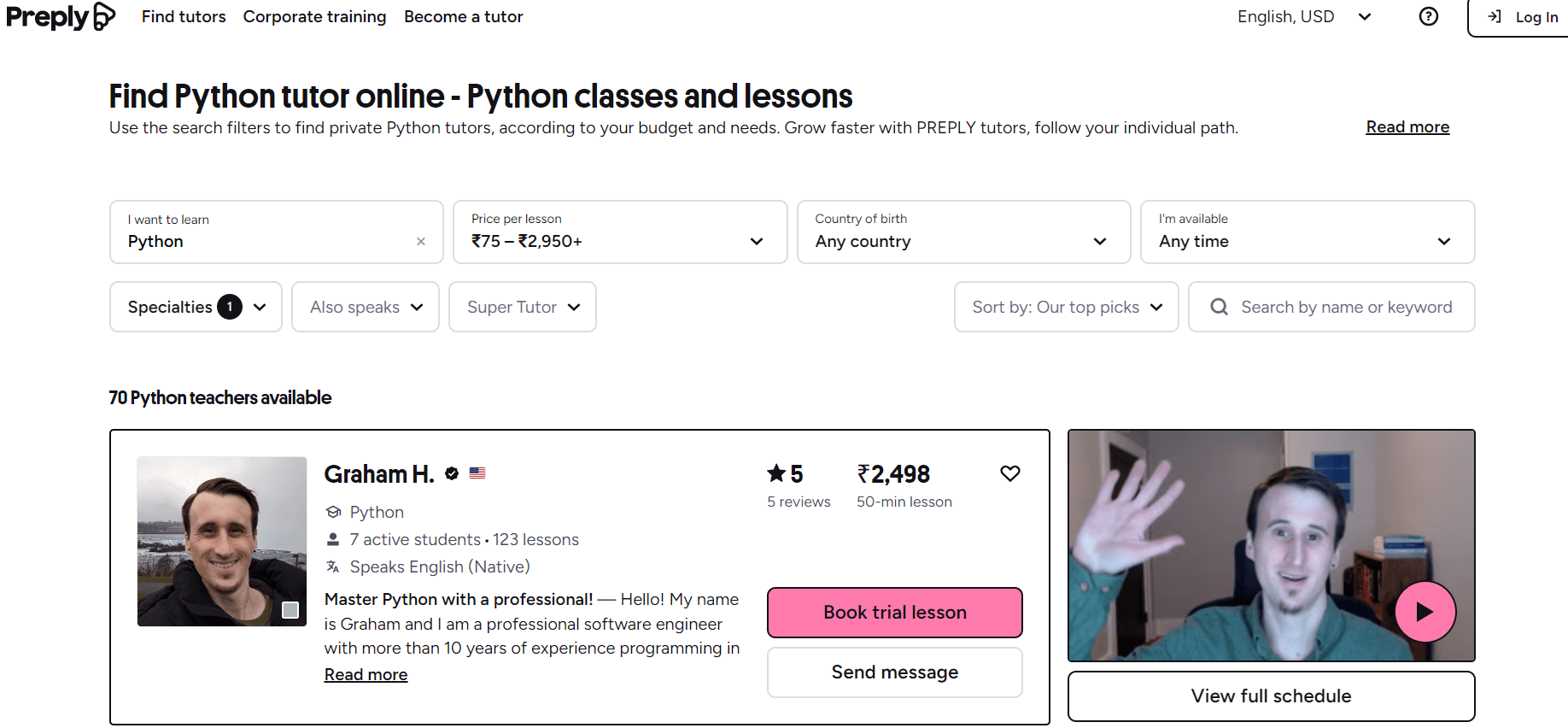
Preply provides 1-on-1 tutoring sessions where you can use various filters to narrow your options to find the most suitable tutor. Preply presents the learner with numerous search filters such as language, availability, country of birth, and price per lesson.
The specialties taught include Python for beginners, Advanced Python, Flask, DRF, Django, Gevent, and AsyncIO. The price for tutors drops depending on nationality.
Key Specs:
- Free Trial: No
- Pricing: $7/hr to $40/hr (Avg: $20/hr)
- Level: All (Beginners, Intermediate Learners, Advanced)
[1.3] Wyzant
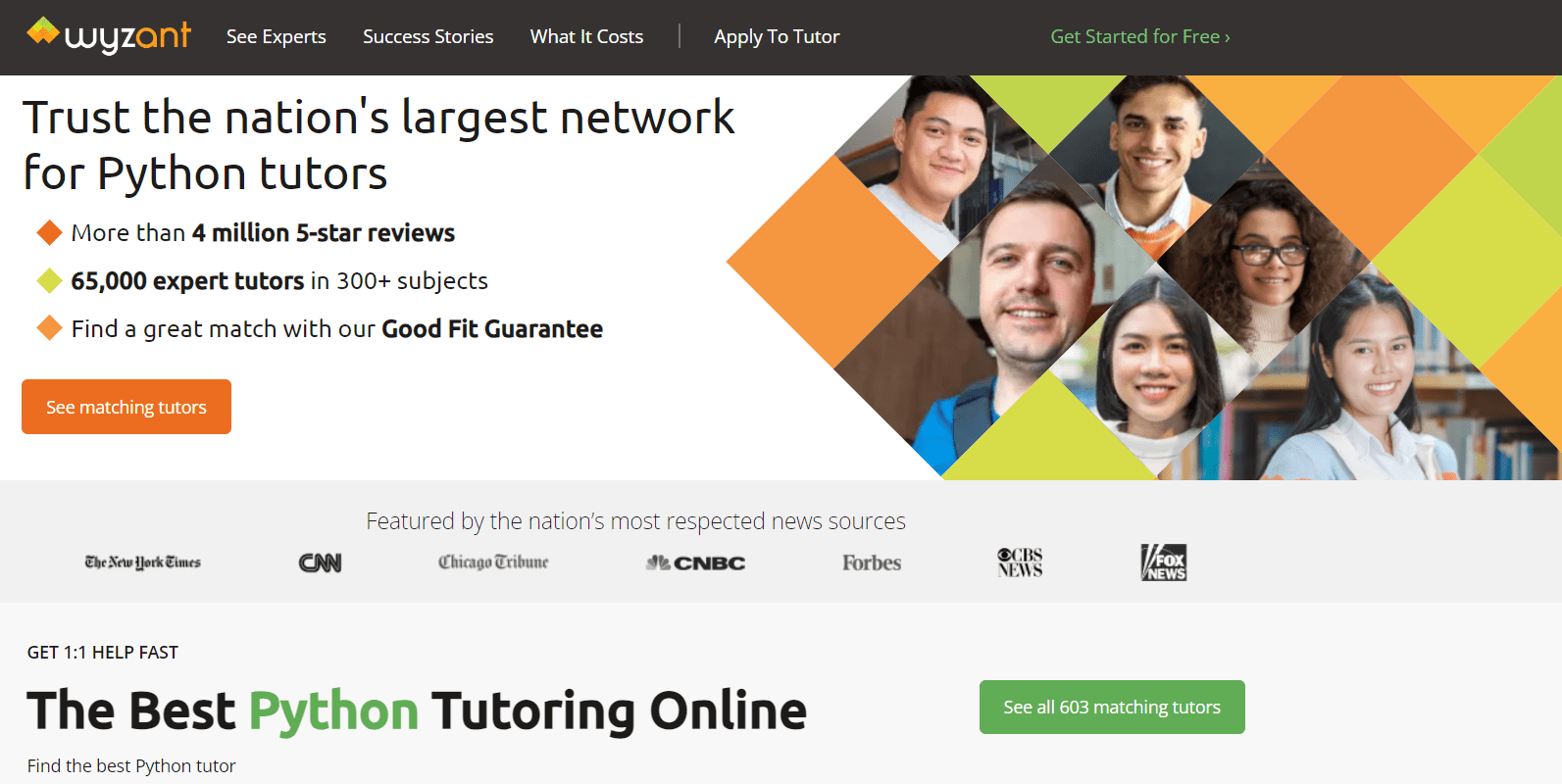
Wyzant is a 1:1 tutoring platform that provides its tutoring service both online and offline. You can compare tutors, by their qualifications, ratings, and fee charged and chat with them for free before you decide to enroll. You will be charged the tuition fee only once you’ve attended the lesson. If you are not satisfied with your first lesson, no fee is charged for it.
Key Specs:
- Free Trial: No
- Pricing: $35/hr to $70/hr
- Level: Beginners, Intermediate Learners, Advanced
For a comprehensive list of the Best online Python tutoring services, head over to our blog!
Looking for personalized Python support? With Wiingy’s 1-on-1 Python tutors, you get expert guidance tailored to your needs. Experience targeted help with concepts, projects, or assignments today!
2. Courses to Learn Python
Online Python Courses provide a structured curriculum, transitioning from basic to advanced levels. They provide regular feedback and evaluation which helps learners track their progress. If you are looking for an interactive and flexible learning method Python Courses are the way to go. The top Python courses to enhance your learning are listed below:
[2.1] [Coursera] Python for Everybody Specialization
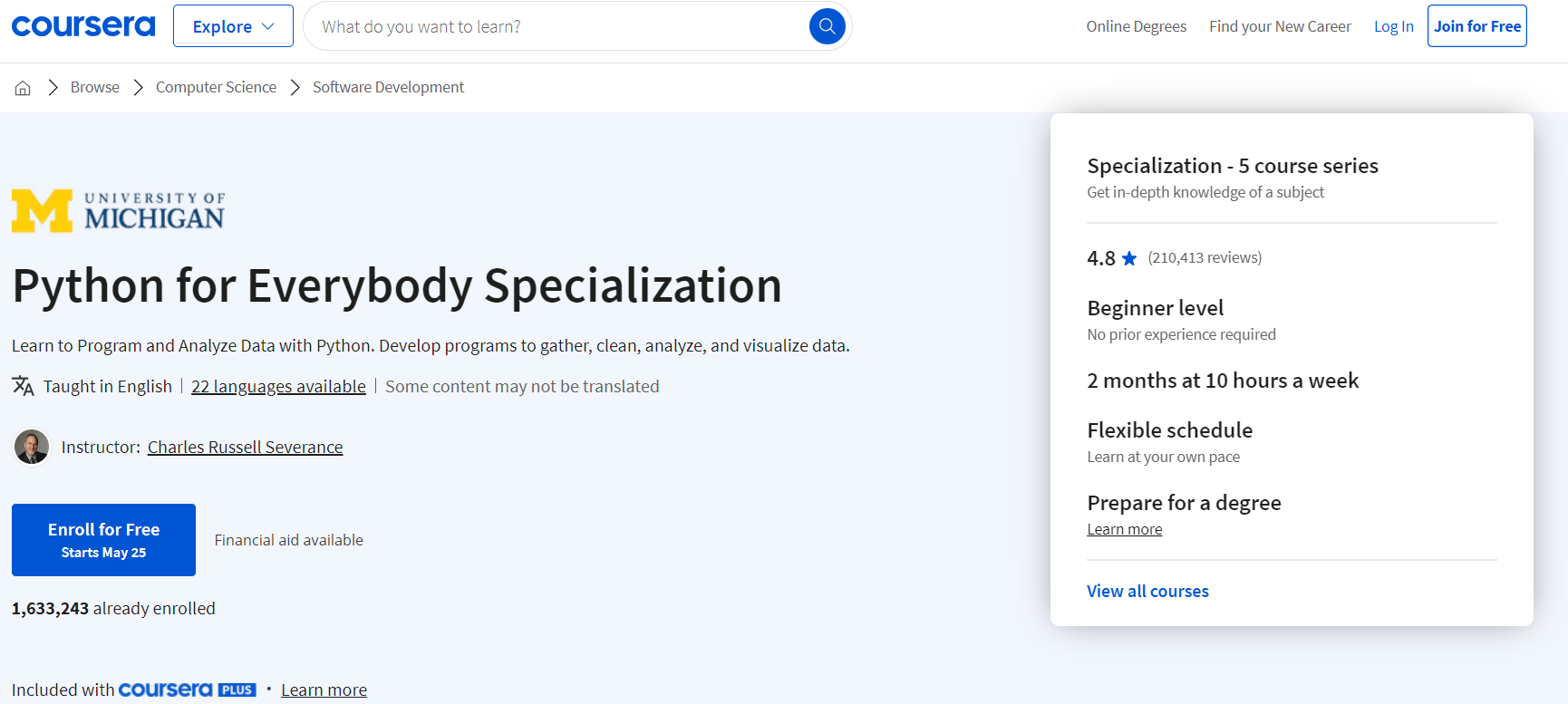
The 5 series course presents the groundwork of Python Programming Language and explains the basic principles of Data Structures, and Dictionaries.
You will learn to retrieve data from websites, work with XML, and learn operations to manage databases.
It outlines the fundamentals of email data visualizations and building a search engine.
Key Specs:
- Duration: 1 month – 20 hours a week (You can learn at your own pace)
- Level: Beginner (No prior experience required)
- Certificate: Available
[2.2] [Udemy] The Complete Python Bootcamp From Zero to Hero in Python
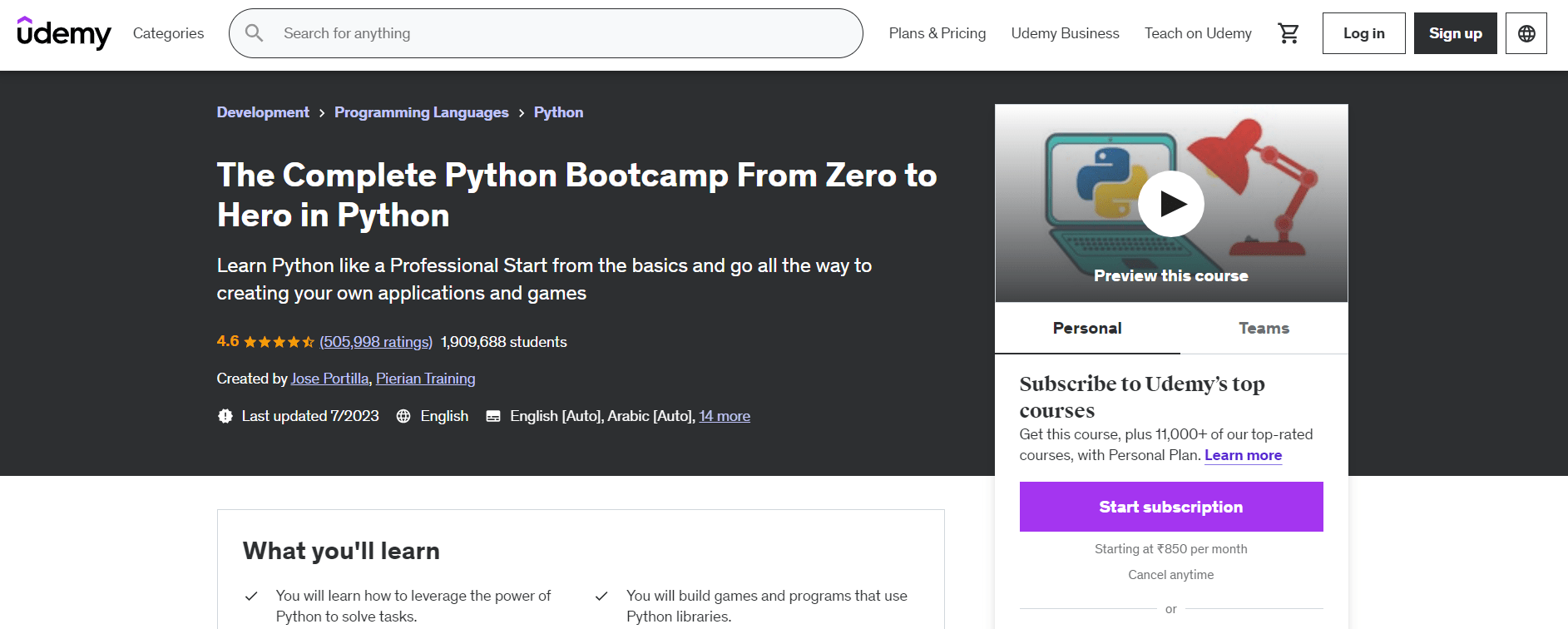
The course prepares the learner to use Python professionally, both Python 2 and Python 3.
The course offers in-depth knowledge of Jupyter Notebook and a thorough understanding of creating GUIs and building games using Python libraries. It also offers a 30-Day Money-Back Guarantee.
Key Specs:
- Duration: 22 hours 13 minutes
- Level: Beginner (No prior experience required)
- Certificate: Available
[2.3] [Codecademy] Learn Python 3
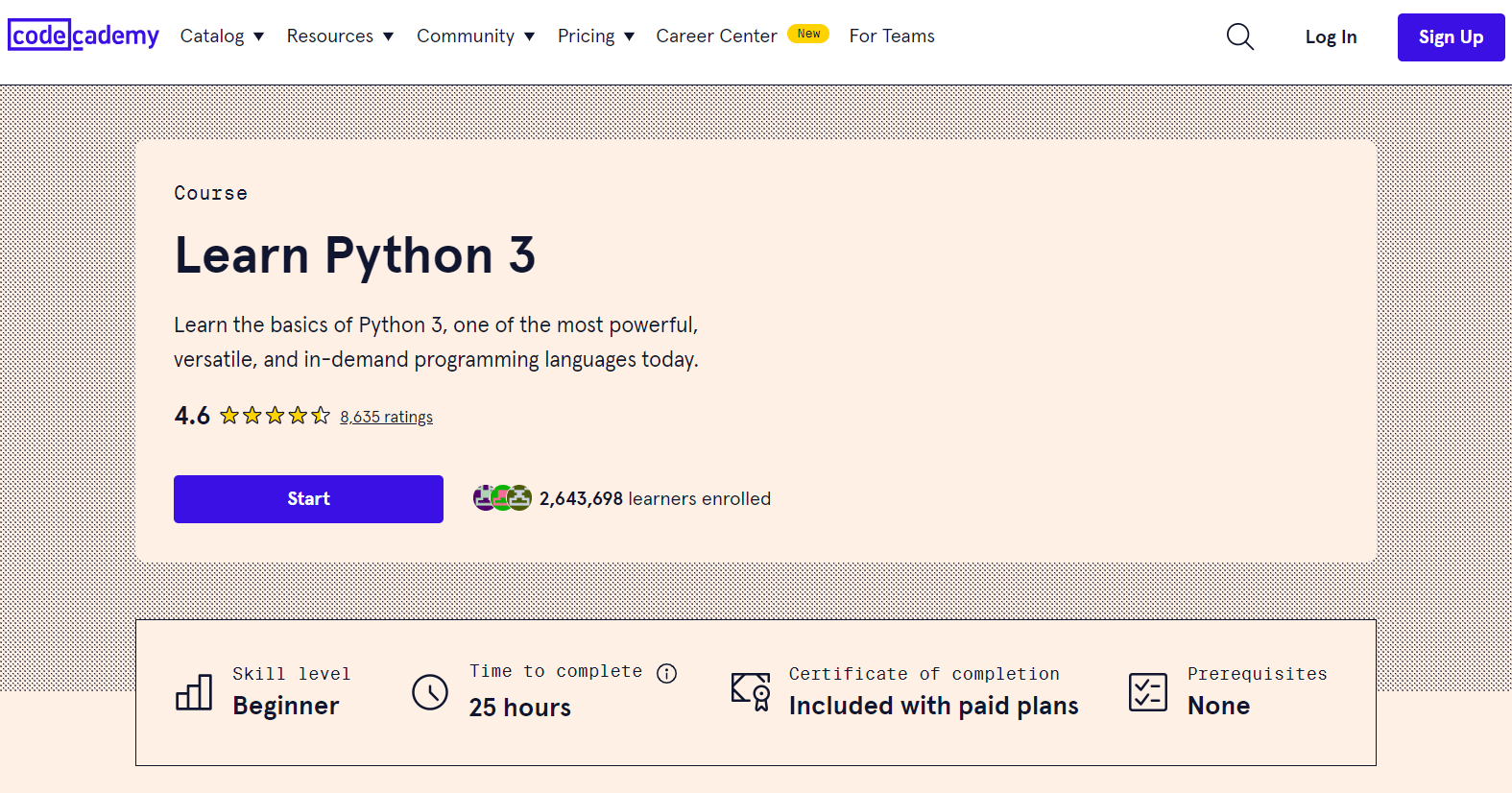
The course introduces you to the basics of Python 3. It provides an overview of Python dictionaries, lists, loops, Strings, and functions.
The course orients you to working on modules, and code reusability and sets the stage for integrating the skills into projects similar to Magic 8-Ball, Block Letters. It provides access to optional coding challenges.
Key Specs:
- Duration: 25 hours
- Level: Beginner (No prior experience required)
- Certificate: Available
For a comprehensive list of the Top online Python courses, refer to our blog!
Struggling to stay on track with self-paced courses? While courses offer flexibility, they often lack personal guidance. Wiingy’s Python tutoring provides real-time feedback to help you master Python faster. Consider switching to personalized support!
3. Web Tutorials to Learn Python
Web Tutorials make learning Python easy for reading Learners. They provide an in-depth description of fundamental to advanced concepts needed to kickstart your journey.
One of the benefits of studying from web tutorials is their availability. They are readily available at all times for the learners to refer to. Here we have the top Python web tutorials to enhance your learning:
[3.1] [Wiingy] Learn Python Programming
Wiingy provides 9 comprehensive modules on Python basics, Python I/O, Python Operators, Data Types, and many more. The modules are 22 hours 13 minutes long covering around 4-11 topics in one module.
The exceptional Handling modules are an hour long with snippets of code blocks for better understanding. Along with theoretical knowledge, the tutorial provides practical insights into the programming language.
[3.2] [w3schools] Python Tutorial
The tutorial explains Java Methods, Classes, File Handling, Type Casting, Operators, and many more. It offers a “Test Yourself with Exercises” section and provides the learner with their own Java Server to test out the concepts learned. The Python tutorial offers learning by Example, Exercises, and Python Quiz.
You can also track your progress with the free “My Learning” program.
[3.3] [Python Docs]The Python Tutorial — Python 3.12.3 documentation
The tutorial introduces you to the most note-worthy features of Python. It does not give a detailed description of the basic concepts but covers the fundamentals of a Python interpreter, its environment, and Data Structures.
Relying on web tutorials for Python? Tutorials are helpful, but they can’t answer your unique questions in real-time. Wiingy’s top Python tutors offer personalized assistance to fill the gaps in your learning and ensure a solid foundation in Python.
4. Bootcamps for Python
An accelerated, targeted training would greatly benefit people looking to learn Python. Bootcamps help learn Python in a sped-up way especially if you are looking to transition from your career background. It is a budget-friendly alternative and the curriculum satisfies the continuous technological advancements in the field.
[4.1] [Springboard] Data Science Bootcamp
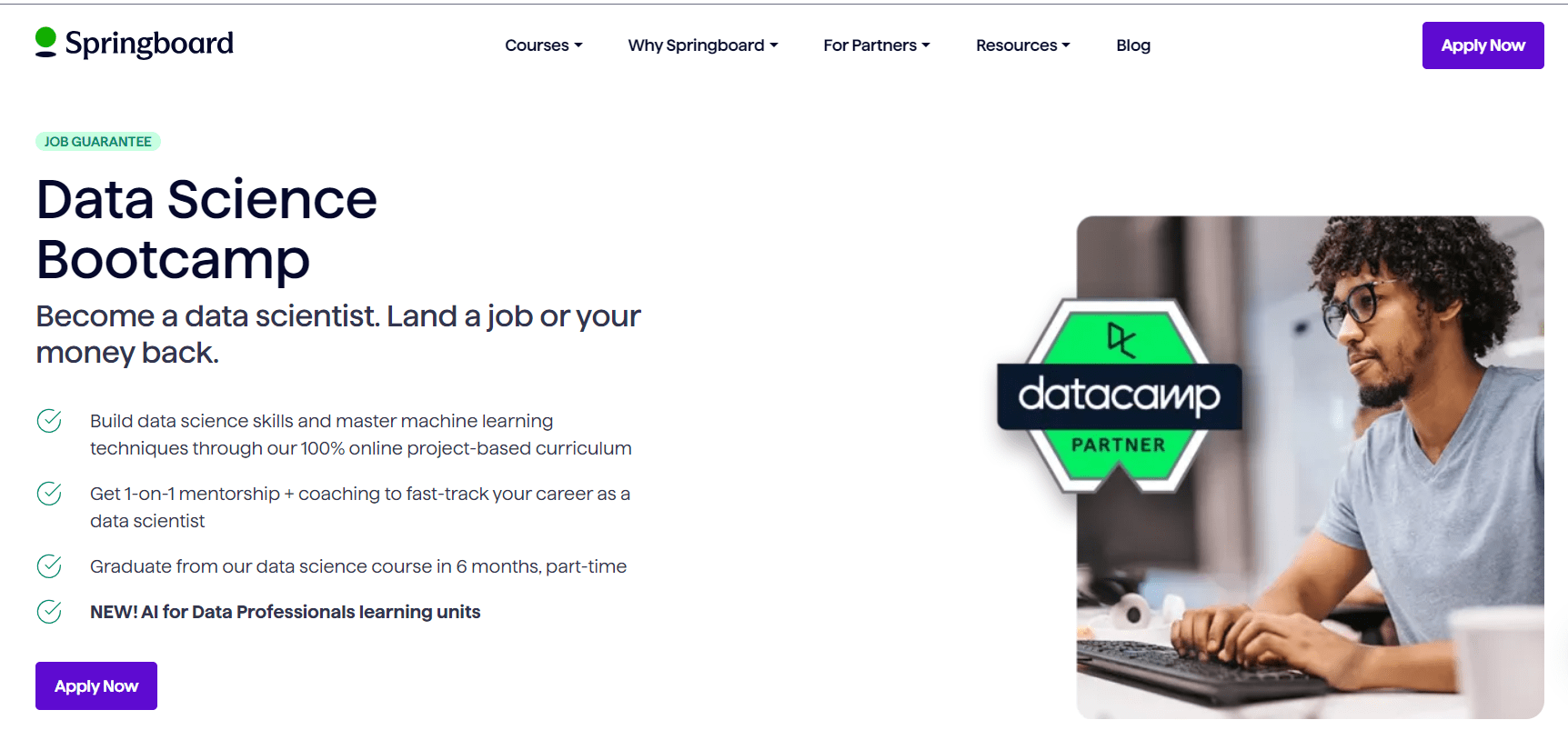
The bootcamp is a 1-on-1 mentorship program that acquaints you with Python, SQL, R, and pandas to elevate your Data Science and Machine Learning skills.
The bootcamp assures employment guarantee and post-completion it connects you on 1:1 calls with a career coach.
The eligibility criteria for landing a job is a bachelor’s degree along with the BootCamp and successful completion of all mandatory coursework.
Key Specs:
- Duration: 6 months (Learn at your own pace)
- Price: $10,900
[4.2] [Udemy] 100 Days of Code: The Complete Python Pro Bootcamp
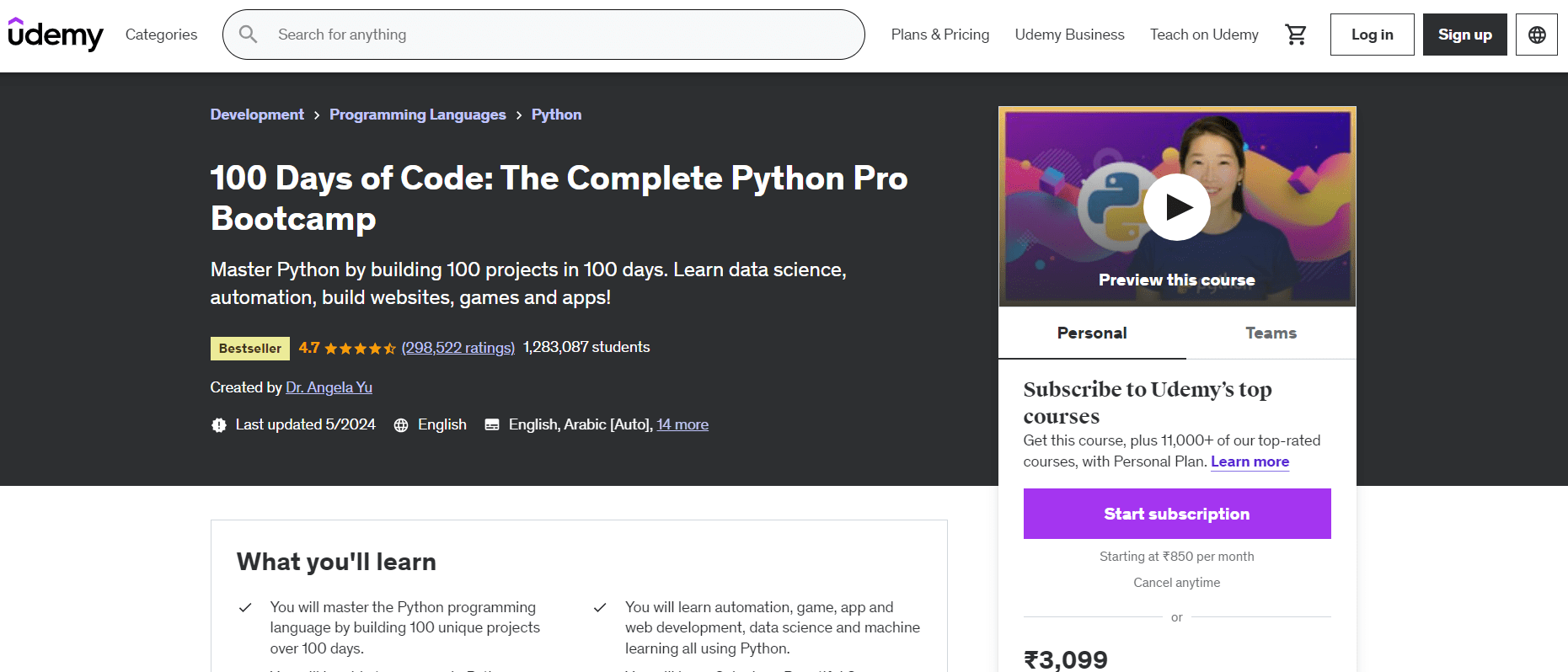
The course teaches the latest technologies and tools used at companies such as Apple, Google, and Netflix through animated videos and stacks of real-world projects. The Bootcamp will elevate you from beginner to professional.
Key Specs:
- Duration: 58 hours 19 minutes
- Price: $37.31
[4.3] [Coding Nomads] Learn Python: The language of the future
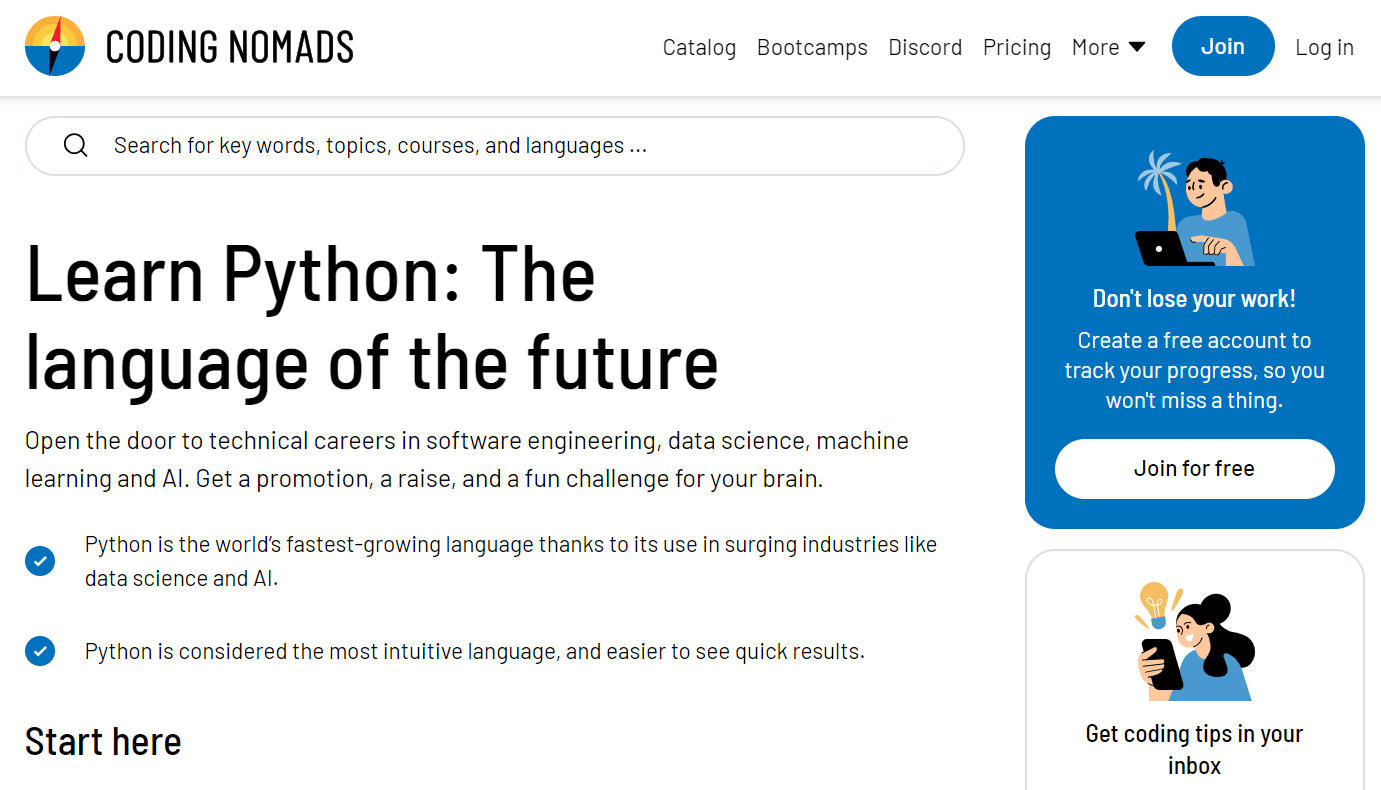
The boot camp would elevate you from being a beginner to an advanced one. The main course incorporates the Django Web Framework, Deep Learning, Machine Learning, and Flask Web Framework.
Fortune, Forbes, and The Balance have ranked Coding Nomads as the best Python course.
Key Specs:
- Duration: 7-10 months
- Price: $1,049 Monthly, $3,796 (4-Month), $11,088 (12-Month Bootcamp)
For a comprehensive list of the Best Python Bootcamps, head over to our blog!
Need more guidance than a bootcamp can offer? Bootcamps are intensive, but Wiingy’s private Python tutors help you focus on specific challenges without the pressure of a fast-paced curriculum. Personalized learning is the key to mastering Python.
5. Certifications for Python
Certifications are bona fide proof of your knowledge of the subject. It is essential even for an experienced developer to have certifications to secure a job. Certifications provide an advantage over other candidates who lack validation for their skills. Apart from an official proof, these certifications give access to workshops, and webinars enriching the learning experience.
Some of the most popular certifications in Python are listed below:
| Certification | Exam Code | Format |
| PCEP™ | PCEP-30-02 | Code insertion, Drag and drop, fill the gap, sort, single and multiple choice |
| PCAP™ | PCAP-31-03 | Single and multiple-choice questions |
| PCPP1™ | PCPP-32-101 | Single and multiple-choice questions |
[5.1] PCEP™ – Certified Entry-Level Python Programmer
The credential assesses the students for Python’s logic and structure, control flow mechanisms, data collections, and built-in user-defined functions.
The certification is highly beneficial for entry-level software developers, data analysts, and testers.
Key Specs:
- Number of Questions: 30
- Passing Criteria: 70%
- Validity: Lifetime
- Exam Duration: 40 minutes
[5.2] PCAP™ – Certified Associate Python Programmer
The credential assesses the students for more advanced aspects of programming consisting of lambdas, generators, and file processing.
The certification is beneficial for junior-level software developers, data analysts, and testers.
Key Specs:
- Number of Questions: 40
- Passing Criteria: 70%
- Validity: Lifetime
- Exam Duration: 65 minutes
[5.3] PCPP1™ – Certified Professional Python Programmer Level 1
The credential assesses the students for proficiency in the advanced use of OOP features, concepts of GUI, and network programming.
The certification is highly beneficial for middle-level software developers, data analysts, and testers.
Key Points:
- Number of Questions: 45
- Passing Criteria: 70%
- Validity: Lifetime
- Exam Duration: 65 minutes
For a comprehensive list of the Best Python Certifications, head over to our blog!
Preparing for a Python certification? Self-study can be tough without direction. Wiingy’s best Python tutors provide tailored support to help you confidently prepare for and pass your certification exams.
6. Python Projects
Once you are thorough with the fundamentals starting a project will help you gain a deeper insight into the language. While making a project you’d encounter multiple queries. In resolving these, you’ll learn new debugging methods and get clarity on the concepts.
To be proficient you need hands-on experience in Python and the most efficient way to do so is to create projects and apply all the Python skills you have learned. Below are the best suitable projects for beginners, intermediate, and advanced levels:
[6.1] Build a Hangman Game With Python and PySimpleGUI

The easiest project to deploy your Python skills is to build a Hangman Game using PySimpleGUI a GUI Toolkit.
It involves importing the random library, defining the logic of the game, and initializing the game state.
[6.2] ChatterBot: Build a Chatbot With Python

The libraries used to build a Chatbot comprise of spaCy, Transformers, TensorFlow, and Flask. Your skills will be deployed in training the chatbot and creating a flask server.
[6.3] Create a Python Wordle Clone With Rich

In this project, the learner will deploy the skills honed from Data Structures and File Handling. Libraries like rich, and random help add a colorful terminal interface.
The user’s learning points would be defining the logic of the game, creating the game loop, and error handling.
For a comprehensive list of the Best Python Projects, head over to our blog!
7. Books for Python
Python books provide comprehensive knowledge about the programming language. The topics are structured in a way, that helps a smooth transition from basics to advanced topics. Books can be used for reference whenever needed, and allow self-paced learning.
[7.1] Python Crash Course, 2nd Edition: A Hands-On, Project-Based Introduction to Programming
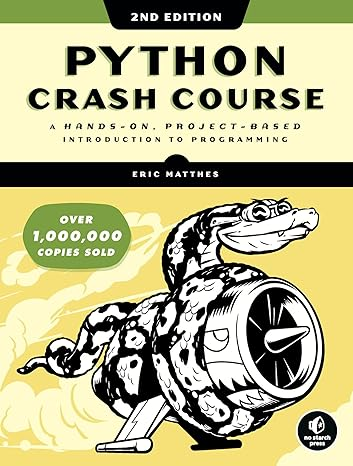
Author: Eric Matthes
It covers Python fundamentals like variables, lists, classes, and loops gradually moving on to the advanced concepts. The book’s last section has 3 projects using tools like Pygame, matplotlib, and Plotly for data visualization and later Django to create a web app.
The book is an ideal initiation for beginners comprising of challenges on what you’ve learned up to that point.
[7.2] Clean Code In Python
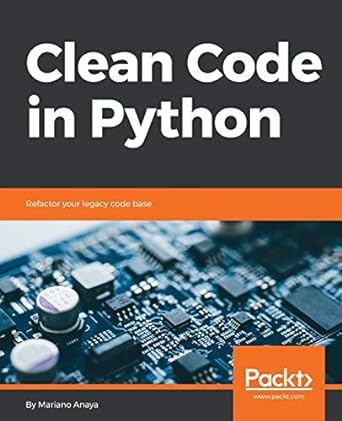
Author: Mariano Anaya
The book highlights the magnitude of clean code, tackling refactoring techniques and microservices.
At the closing stages, the learner can set up a productive development environment by leveraging automatic tools, creating advanced object-oriented designs using descriptors, and eliminating duplicated code using software engineering principles.
The book is a perfect fit for experienced learners. It is ideal for team leads, software architects, and senior software engineers.
The book requires you to have a strong basic understanding of the programming language.
[7.3] Fluent Python: Clear, Concise, and Effective Programming
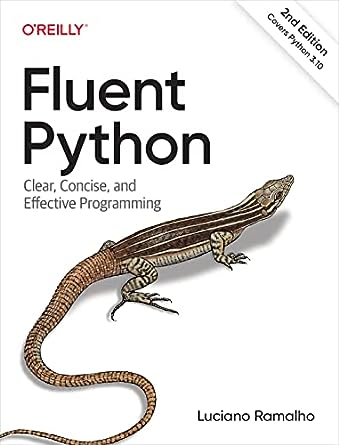
Author: Luciano Ramalho
Fluent Python is a great bridge from intermediate to advanced Python. The book has 5 short books within it addressing areas like:
- Data structures: Sequences, dictionaries, sets, Unicode, and data classes
- Functions and Control flow
- Object-oriented Concepts: Composition, Inheritance, Interfaces, Operator Overloading, Protocols.
- Metaprogramming: Properties, Descriptors, Decorators.
For a comprehensive list of the Best Python Books, head over to our blog!
Books are great, but they need more than theory? Python books provide in-depth knowledge, but without interaction, learning can feel incomplete. Wiingy’s Python tutors bring concepts to life with personalized, interactive sessions that supplement your reading.
8. YouTube Channels to learn Python
Learning Python is streamlined by YouTubers. YouTube channels help learners save money, time, and energy, which helps them employ their resources more efficiently. YouTube is the best source for learning Python free of cost.
Some of the famous YouTube channels that have helped learners all over the world learn essential Python coding skills are listed below:
[8.1] Corey Schafer
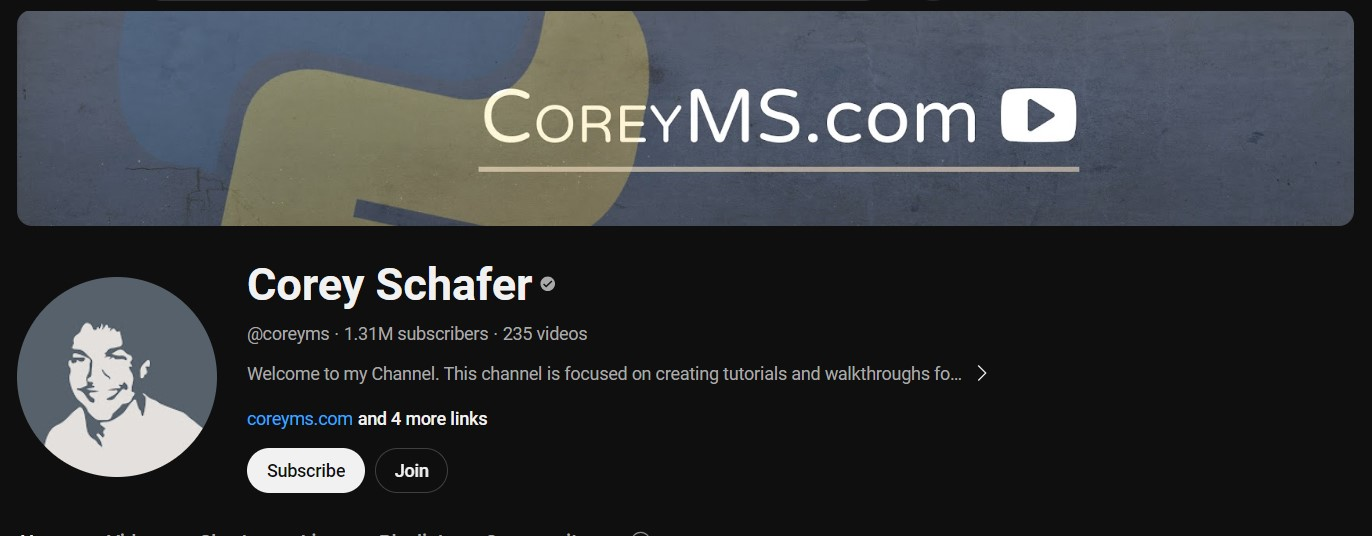
Corey Schafer has a comprehensive series of videos on Flask, Django, Matplotlib, and Pandas. From setting up a Python environment tutorial to Python OOP Tutorials the channel covers it all.
The channel meets the needs of beginners to advanced learners.
His teachings dispel confusion and bring clarity. The tutorials are said to be fast, clear, and straight to the point with no new or confusing points that leave one hanging.
He also provides the link to the source code for every video.
About the channel: (Info as of May 24)
- Joined: Jun 1, 2006
- Views: 95,301,689iews
- Subscribers Count: 1.31M subscribers
- No. of Videos: 235 videos
- Average Duration of Videos: 15 minutes
- Based In: United States
[8.2] Sentdex
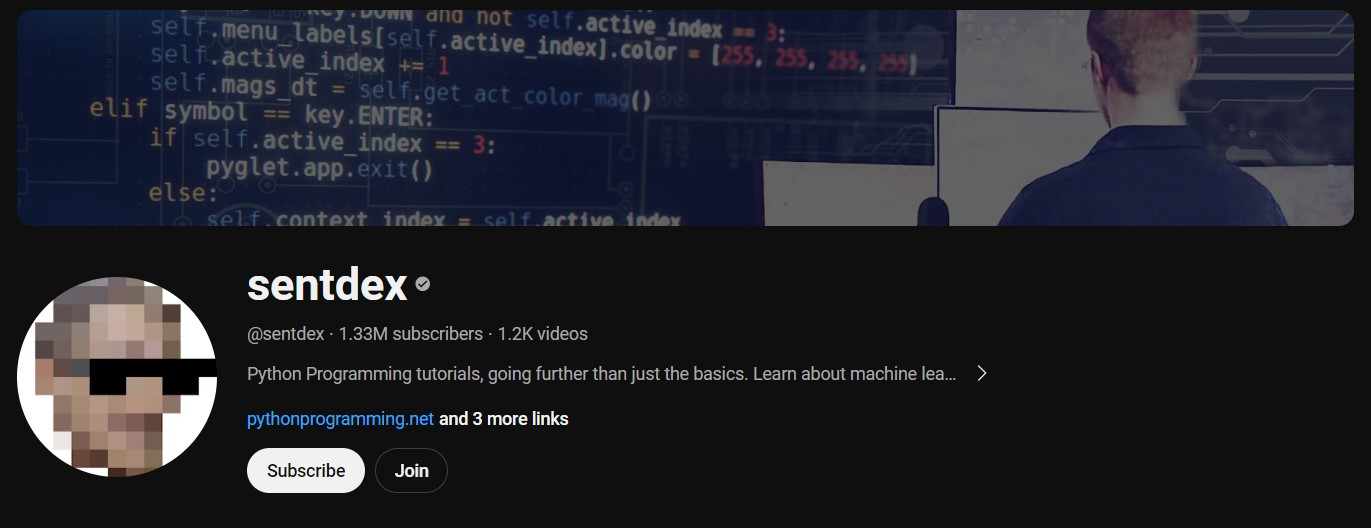
Setdex has basic Python Programming tutorials on Tuples, Strings, Built-in Functions, Indexes, Slices, and Error Handling.
Ranging from fundamental programming concepts to advanced Python topics, Sentdex has material on Neural Networks, Django Web Development, Deep Learning, and Data Analysis with Python.
The videos are compiled into multiple playlists like Face Recognition with Python, Pytorch- Deep Learning with Python, Self-driving Cars with Carla, Python, and many more.
About the channel: (Info as of May 24)
- Joined: Dec 17, 2012
- Views: 114,652,078 views
- Subscribers Count: 1.33M subscribers
- No. of Videos: 1,254 videos
- Average Duration of Videos: 15-20 minutes
- Based In: United States
[8.3] Programming with Mosh
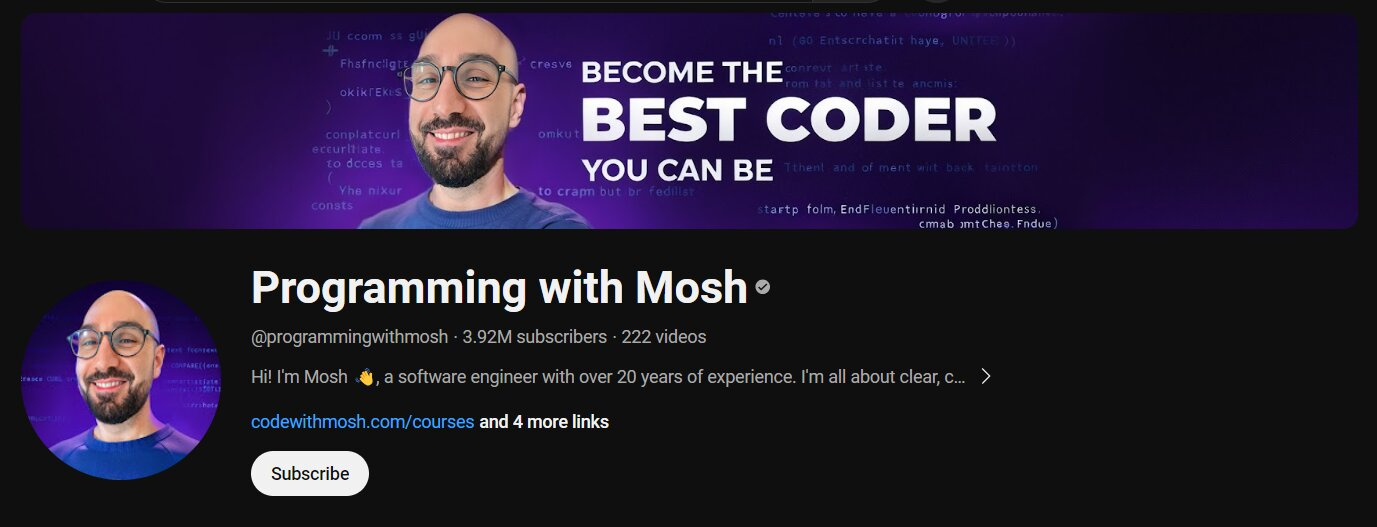
Multiple videos ranging from Python for Beginners – Learn Python in 1 Hour to Python Machine Learning Tutorial (Data Science)
Mosh provides free access to Python Cheat Sheets and exercises for beginners.
Mosh demonstrates the possible mistakes you can make and even corrects them. For an absolute beginner, this is a perfect platform to master Python.
About the channel: (Info as of May 24)
- Joined: Oct 7, 2014
- Views: 201,471,565 views
- Subscribers Count: 3.91M subscribers
- No. of videos: 222 videos
- Average Duration of Videos: 10-minute short videos, 1-2 hour courses
- Based In: United States
Learning Python on YouTube? Free videos are useful but lack the personal touch needed for real mastery. Wiingy’s top Python tutors offer tailored guidance to help you fully understand the material and advance more quickly.
9. LinkedIn Learning for Python
LinkedIn Learning is an impactful way of learning Python and making your resume competent at the same time.
The courses can be accessed on phones or tablets and the certification can be showcased on your LinkedIn profile under the “License and Certificates” section. This adds credibility to your skills and improves the prospects of your profile being noticed.
Some of the popular LinkedIn courses for Python are:
[9.1] Python for Non-Programmers: Python from zero
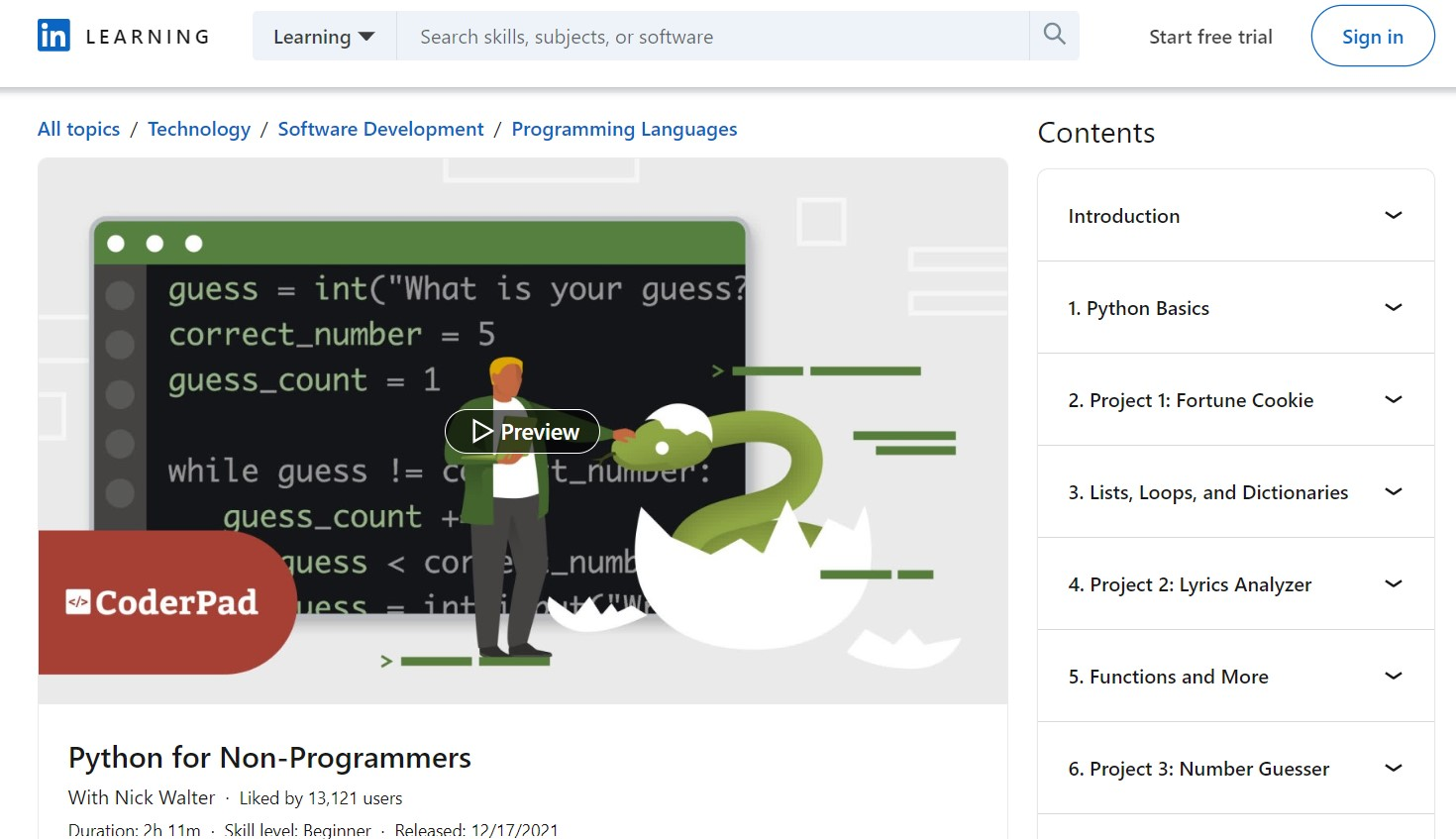
As the name suggests the program is designed for entry-level programmers to cement their core skills.
The tutorial involves a step-by-step explanation with a quick challenge to test if you’ve grasped the concept. The course includes three complete projects, a digital fortune cookie, a word counter, and a number guessing game.
Course Outline:
- Duration: 1h 55m
- Level: Beginner
- Rating: 4.8 out of 5
[9.2] Python Essential Training: Getting Started with Python
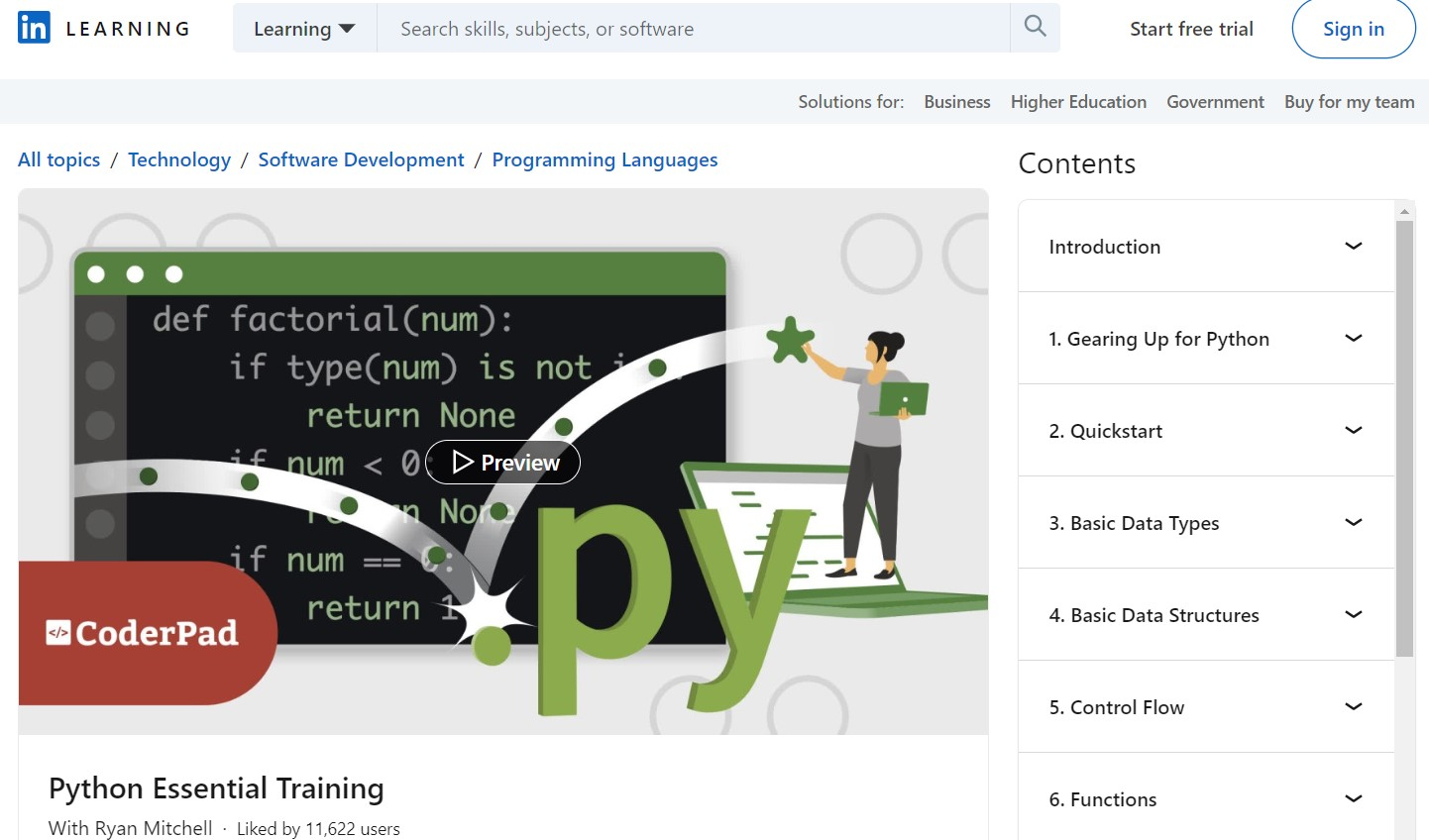
The course encompasses Python, pip, Jupyter Notebook installation, and Python basics – Variables, Operators, Functions, Classes, Objects, and more. It touches basic data types like ints and floats, Booleans, and Strings.
The tutorial takes on basic data structures, control flow, functions, classes, and objects. It addresses how to handle errors and exceptions.
Course Outline:
- Duration: 4h 22m
- Level: Beginner
- Rating: 4.7 out of 5
[9.3] Learning the Python 3 Standard Library
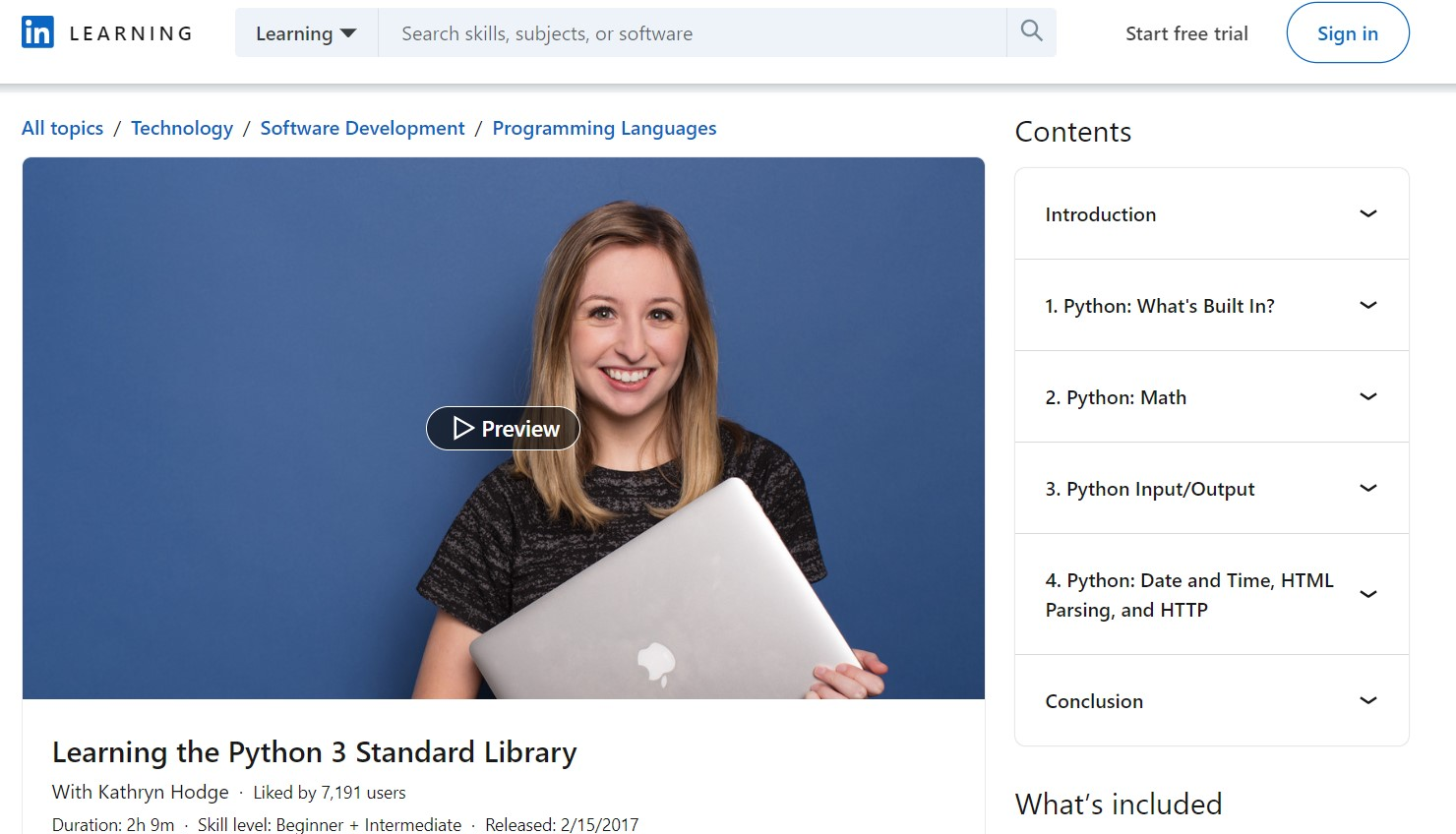
Command in Python libraries makes coding quicker. In this Python 3 course, Kathryn Hodge perfects the basis in the Python standard library. The tutorial would familiarize you with the Python HTML parser module, JSON Module, and Text Wrap Module.
After the course, you’d be efficient enough to calculate future times, create a timer, and format dates and times using the Python calendar, Python time, and DateTime.
Course Outline:
- Duration: 2h 9m
- Level: Beginner + Intermediate
- Rating: 4.6 out of 5
Using LinkedIn Learning but need deeper insights? While LinkedIn courses are great for professional development, Wiingy’s Python tutors offer personalized attention and real-time support, helping you gain confidence and proficiency.
About Python: explained
Python the next-generation ABC Programming Language, was developed in the late 1980s by Guido van Rossum. A general-purpose programming Language, Python is not limited to solving problems of a particular domain. Python is free and open-source software. It is available for cost-free download from the official Python Programming Page.
Python has diligently maintained its feature of a comprehensive suite of in-built libraries, which cancels the need to download separate packages. Owing to this, it is commonly referred to as “battery included”.
Since the evolution of Artificial Intelligence and Data Science, Python a versatile and functional programming language has been adapted enormously by machine learning engineers worldwide making it one of the most popular programming languages. It has been recognized as the Programming Language of the Year by the TIOBE Programming Community Index due to its highest rise in ranking in 2007, 2010, 2018, and 2020, making it the only language to hold the title for 4 years.

Features of Python
Various Python features that make it one of the most popular/easiest programming languages are listed below:
Simple Structure: Python syntax is direct, concise, and user-friendly. Unlike Java and C++, you do not need prior coding experience to pick up the syntax.
Object-Oriented Programming Language: Python is an Object Oriented Programming Language that uses concepts like Objects, classes, Inheritance, Polymorphism, Abstraction, Encapsulation, and many more
Portability: Python is a platform-independent language. Python code can be executed on any platform (such as Windows, Mac, Linux) without any modifications.
Dynamic Typing: In Python Language, datatype declaration of a variable is not required, assigning a value is sufficient. The Python compiler is unaware of the data type of the variable till the run-time.
Integration Language: Often termed a “glue language”, Python can extend to other languages like Java/C++. The performance-centric code can be written in Java/C++. This way the existing libraries of Java/C++ can be accessed within the Python code.
Graphical User Interface: Python has a comprehensive set of libraries to create GUIs. The top libraries are Tkinter, wxPython, and JPython. The standard library for generating GUIs is Tkinter.
Robust Standard Library: Unlike other programming languages, Python has extensive libraries like TensorFlow, Pandas, NumPy, Matplotlib, and PyTorch which cut down on the programming segment.
Read-Evaluate-Print Loop (REPL) Environment: Python compiles the code line by line making debugging easy. Piecewise execution is beneficial for learners.
Why learning Python is essential for students and programmers
Python has gained immense popularity among developers due to its simple structure and Dynamic typing. Complex Software Development, Data Analysis, Data Visualization, Machine Learning, Web Development, and Financial Analysis demand Python developers.
Here we have curated a list of all the high-paying jobs that require fluency in Python:
- Data Engineer
- Finance
- Web Development
- Data Scientist / Data Analyst
- Machine Learning Engineer
- Game Development
- Search Engine Optimization (SEO)
- Python Developer
For more information, head over to our blog for a comprehensive idea of the Applications of Python!
How to improve Python Skills?
To improve Python skills learners can seek help from expert Python tutors. Once you are thorough with the concepts move to project building.
To be proficient you need hands-on experience in Python and the most efficient way to do so is to create projects and apply the Python skills learned. It is typical, for you to face problems while working on a project, extensive research will help you build practical skills.
The top tips to help improve your Python skills are:
Explore the rich ecosystem of Python libraries: Use the standard libraries for data analysis, machine learning, and web development.
Understand the logic of the code: DO NOT COPY PASTE CODE. Practice coding regularly on LeetCode, HackerRank, or Codecademy. Take up coding challenges to push your limits.
Engage With Experts: Interacting with an experienced programmer would help you gain confidence. You feel a sense of belonging in your struggling arc. Sharing perspectives, ideologies, and learning techniques would help boost your journey. Sometimes, the best expert can be an experienced python tutor. Wiingy offers private 1-on-1 python tutoring for learners of all levels, starting at $28/hr.

Teach Beginners: One effective way to enhance your Python knowledge and gain deeper insights into foundational concepts is to teach novices. If you are struggling with intro to programming, working with a personalized tutor can help solidify your understanding. Along with brushing up on your Python concepts, you’ll stay in touch with new technologies the market offers in the programming domain.
Dry run a code: To understand the logic of a code it is essential to walk through the code before you compile it. This would help detect logical errors and contribute to your critical thinking ability and coding skills.
Debug a code: Isolating complex sections of code and walking through them gives you a clearer idea of its logic.
To learn more about How to Improve your Python skills, be sure to check out our blog!
Looking to Learn Python? Book a Free Trial Lesson and match with top Python Tutors for concepts, projects and assignment help on Wiingy today!
Conclusion
There are various ways to learn Python, but online tutoring stands out as the most effective option for mastering the language.
- Online Python Tutoring provides tailored, one-on-one support, helping you overcome challenges with real-time guidance—find top Python tutors on Wiingy!
- Python Courses offer structured, flexible content, perfect for self-paced learners, though they may lack personalized feedback.
- Python Web Tutorials are great for quick, on-the-go learning, but may not delve deeply into advanced concepts.
- Python Bootcamps provide immersive, fast-paced learning experiences for career transitions, but can be more intensive and costly.
- Python Certifications validate your skills and are valuable for job seekers, offering credibility to your Python proficiency.
- Python Projects give you hands-on experience and allow you to apply what you’ve learned, helping you build real-world skills.
- Python Books offer in-depth coverage of the language, ideal for self-study but may not provide interactive feedback.
- YouTube Channels provide free access to a variety of tutorials and coding challenges, though you might need to supplement this with more structured learning.
- LinkedIn Learning is a great resource for professionals seeking real-world applications and the opportunity to add credentials to their profiles.
Ready to take your Python skills to the next level? Book a free trial lesson with Wiingy for personalized tutoring from expert Python instructors!
More Python resources
Top Online Python Courses
Best Python Bootcamps
Best Python Projects
Best Python Certifications
Best Ways to Learn Python Programming
How to build a Python Portfolio?
Debugging 101
Reasons Why Python is the Best Option for Developers
Top 7 Python Competitions and Contests
Additional reads
How to Learn Java
How to Learn SQL
How to Learn C++
How to Learn JavaScript
How to Learn Coding
How to Learn French
Frequently Asked Questions
What is the most effective way to learn Python quickly?
The most effective way to learn Python quickly is through personalized, one-on-one tutoring. Online tutoring helps you focus on the specific areas where you need improvement, providing real-time guidance and feedback. With Wiingy’s online Python tutoring, you can learn at your own pace with expert tutors who tailor lessons to your learning style and goals.
Ready to learn Python fast? Book a free lesson with one of our expert Python tutors today!
What are the best resources for learning Python?
The best Python resources include online courses, web tutorials, books, and projects. However, the most effective way to master Python is through personalized tutoring. Wiingy’s online Python tutoring offers you the chance to work directly with experienced Python tutors who provide hands-on guidance, ensuring you fully understand each concept.
Want access to the best Python learning resources? Book a free trial with a top Python tutor and start learning effectively today!
How can online tutoring help me learn Python fast?
Online Python tutoring helps you focus on the areas that matter most, speeding up your learning process. With Wiingy, you get personalized attention, real-time feedback, and a curriculum tailored to your learning pace, making it one of the most efficient ways to learn Python fast.
For more insights on how private tutoring can support Python beginners in building a strong foundation, take a look at our blog which discusses the benefits of tutoring for those new to Python.
Book a free trial lesson with Wiingy and start learning Python efficiently today!
How long does it take to learn Python?
For people without a programming background (beginners), it would take 9-12 months to get hold of the language.
If you know how to code, you can learn advanced Python in around 6-8 weeks.
How to learn Python for free?
1. Take up a Free Python course
2. Take tips for learning Python from experienced programmers
3. Take the help of Free Python web tutorials listed above
4. Join the Python community to expand your resources
Can I learn Python at an advanced age?
Yes, you can learn Python at an advanced stage. According to a survey by FreeCodeCamp, more than half of their students are over the age of 30, and 11% are over the age of 50. You always have to learn something new regardless of your age. Start by identifying why you want to learn Python, identify the learning resources that align with your learning methods, and then get started. Interact with Python enthusiasts and take inspiration.
Can I self-learn Python?
Yes, you can self-learn Python. It is one of the easiest programming languages. Start your learning journey by getting into the depth of the basic concepts through Python courses, tutoring, or YouTube Channels mentioned above in the article. Tune in to Python-related podcasts. Be a part of Python communities to grasp basic Python skills. Start by building basic Python applications to deploy the skills acquired.

Mar 27, 2025
Was this helpful?





